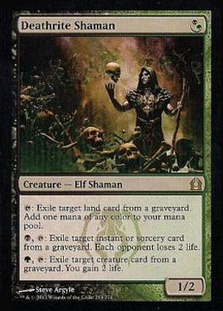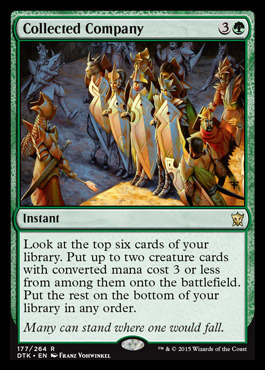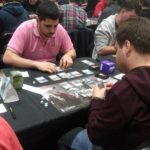Magic Mistakes – Weapon of Choice

As Grand Prix Birmingham is just around the corner, today I would like to talk about the probably most important decision that we have to make when we are facing a constructed tournament: choosing which deck to play.

First of all when we talk about constructed we have to divide the formats in two types, shorter ones and the eternals. It makes a lot of difference having a determinate metagame like we have in Standard or in the old Block Constructed, where you can adapt your deck to your opponent’s strategies and consequently be prepared for everything. We know what’s going on, so it’s almost impossible to be surprised or have a pairing where we don’t have any plan after sideboard.
Then we have the eternal formats, Legacy and Vintage where you can play almost every card ever printed, so the possibilities are many which also means that it’s impossible to be prepared against everything, and the only thing you can do is focus on preparation against the tier 1 decks and hope not to be paired against something too random that you can’t beat. This demands sideboard cards which are very versatile. Unfortunately both Legacy and Vintage aren’t too competitive so we are going to leave then on the sidelines, and focus on what I wanted to talk today; the world of Modern.

Modern is at the moment the most popular format in the world, because it has the good part of the eternal formats, where your cards rotate out, yet it’s still affordable and it isn’t too powerful like Legacy or Vintage, where the games can easily end in the first turn or 2. I’ve been playing modern since its inception, so I’m very experienced with it. I could say I know every strategy, and thanks having access to cards both online and in paper, I’ve tried all the main ones. I like to change through all the archetypes and styles. This is good and bad at the same time, because I’m very open so I don’t get stuck but you don’t become a master of any deck. It’s common to see players in eternal formats that have been playing the same deck for years, and even if they are not exceptional players they have become masters of their chosen deck. Modern is a format that rewards knowing your own deck very well, and this has been demonstrated by the many players who have piloted unfancied decks to Grand Prix top 8’s
And what happens if I’m not a master of any deck?
Well, this is the situation most players are faced with. In this case a high percentage of the field will simply research decklists on one of various websites and end up simply lifting a full 75 from an archetype that has been performing well recently. I think this approach is WRONG! Playing in a competitive level, this is by far the most common mistake(and one i have made several times) because unless you have a full deck guide coming with your list you aren’t going to really understand how it’s built and with that you are going to miss a lot of interactions.
So, how do I choose a deck?
Magic is like a sport, you can’t go to the match without training and expect to win. You have to start with a solid list and start testing, trying to change things and if you keep track of your result, or more importantly of your sensations and thoughts on every matchup, it’s going to be easy to identify the deck’s weak points and with that improve.
If upon going to Sideboard you have to think about what to take out and what to bring in it means that you haven’t done your homework, and so you weren’t fully prepared.
With all of this theoretical information it is time to go and see the field work out where to start from..

Keys in modern:
1.- Be proactive: as modern has a big metagame and in a big event like a GP we can’t really anticipate what are we going to face, so it’s much better to have a proactive deck rather than a reactive. If we can’t predict what we will face we cannot plan to react to it.
2.-Play comfortable: we are going to be playing 15 rounds between 2 days, so we need to be playing something we are used to. If you haven’t ever played control don’t go for that, or you will likely struggle.
3.-Play a good deck: this might sound a bit stupid, but I often see people playing under powered strategies and losing just because they are one step behind. Don be this person.
4.-Find a partner: try to find someone playing the same deck, so you can discuss cards and matchups. and get a different point of view and don’t get stuck on one viewpoint.
After all this, once you’ve got your deck, just play, play as much as you can. Look for content, come to your own conclusions.. The best tool at the moment to test is Magic Online, but if you don’t have access to this, try to make a playtest group with people with similar goals. If you don’t have too much time to play during the week try to optimize the time you do have. It is better to meet a whole afternoon testing than go to the FNM and play 4 rounds. Don’t focus on winning, focus on learning and improving, try to get something out of every game. Personally I have a Skype group where we play and discuss plays and I find it very helpful.
I hope you’ve learnt something, and I’ll be happy to answer any question, thanks for reading.





